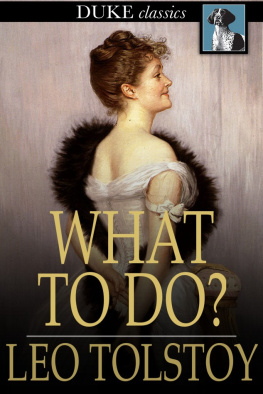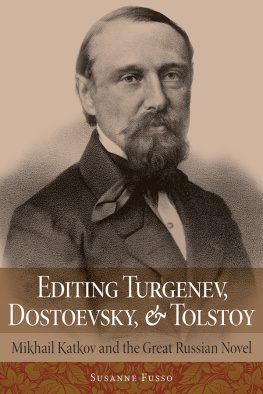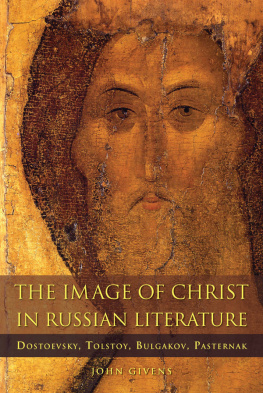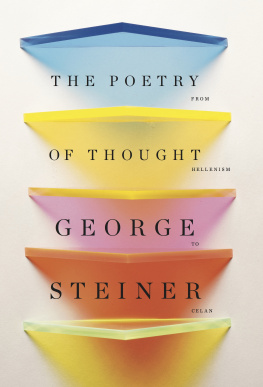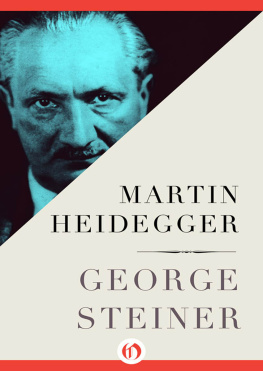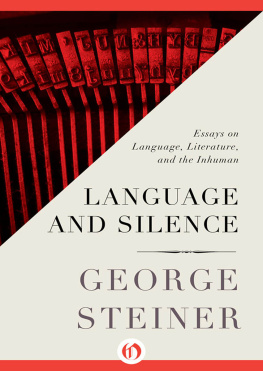George Steiner - Tolstoy or Dostoevsky
Here you can read online George Steiner - Tolstoy or Dostoevsky full text of the book (entire story) in english for free. Download pdf and epub, get meaning, cover and reviews about this ebook. publisher: Open Road Integrated Media, genre: Science. Description of the work, (preface) as well as reviews are available. Best literature library LitArk.com created for fans of good reading and offers a wide selection of genres:
Romance novel
Science fiction
Adventure
Detective
Science
History
Home and family
Prose
Art
Politics
Computer
Non-fiction
Religion
Business
Children
Humor
Choose a favorite category and find really read worthwhile books. Enjoy immersion in the world of imagination, feel the emotions of the characters or learn something new for yourself, make an fascinating discovery.
- Book:Tolstoy or Dostoevsky
- Author:
- Publisher:Open Road Integrated Media
- Genre:
- Rating:5 / 5
- Favourites:Add to favourites
- Your mark:
- 100
- 1
- 2
- 3
- 4
- 5
Tolstoy or Dostoevsky: summary, description and annotation
We offer to read an annotation, description, summary or preface (depends on what the author of the book "Tolstoy or Dostoevsky" wrote himself). If you haven't found the necessary information about the book — write in the comments, we will try to find it.
Tolstoy or Dostoevsky — read online for free the complete book (whole text) full work
Below is the text of the book, divided by pages. System saving the place of the last page read, allows you to conveniently read the book "Tolstoy or Dostoevsky" online for free, without having to search again every time where you left off. Put a bookmark, and you can go to the page where you finished reading at any time.
Font size:
Interval:
Bookmark:

Tolstoy or Dostoevsky
An Essay in Contrast
George Steiner

In Memoriam: Humphry House
Preface to this Edition
This is a young mans book. It was written, as first books ought to be, out of sheer compulsion. It was my conviction that Tolstoy and Dostoevsky tower over the art of fiction; that their pre-eminence entails certain fundamental points about western literature as a whole (so far as the Russian novel may be said to belong to this literature); and that the readers inevitable preference of the one master over the other will define a whole philosophic and political stance. These propositions had overwhelmed me; and this book was written in order to share with others a vehement and necessary awareness.
Twenty-one years later, I still subscribe to these convictions, though I would now qualify them. The magnitude of the Tolstoyan and Dostoevskyan performance still seems to me unmatched. But there are in Proust categories of intelligence, of psychological acuity and philosophic discovery which make of the Remembrance of Things Past an indispensably central act. T. S. Eliot spoke of the ways in which Dante and Shakespeare divide our world between them. Proust seems to me a party to this division, knowing as much of evil as does the Commedia and no less of grace and music as do Shakespeares late plays.
If I were to rewrite this study, moreover, I would want to show that there are possibilities, though rare and unstable, of a congruence between the antithetical worlds of Tolstoy and Dostoevsky, that there can, momentarily as it were, be refusals to choose between them. The case I have in mind is that of Kafka to whom Tolstoys Death of Ivan llych and Dostoevskys Letters from the Underworld were equal sources of vision, for whom the metaphysical melodrama of Crime and Punishment proved no less seminal than the epic parable in Tolstoys Snowstorm. In particular, I would want to argue that Kafkas economy is underwritten by the preceding prodigality of the two Russians.
Translated into other languages, this book has elicited much discussion. I have learned from my critics, of course. But I remain unrepentant on what has been the most controversial point: my working metaphor (it was no more than that) in respect of the Legend of the Grand Inquisitor in The Brothers Karamazov. The analogies between the tragic casuistry of the Inquisitor and certain fundamental propositions in the counter-theology of the later Tolstoy are at once uncanny and substantial. Dostoevskys antennae for the motions of spirit in other men were of a rare force of exactitude and anticipation. We know his meditation on Tolstoy to have been frequent and most intense. This meditation leaves only oblique traces in his published writings. Hence my conjecture. More generally, I remain convinced that there is much still to be understood about the reciprocal awareness of the two giants and about the interactive pressures which this awareness, externally so barren, exercised on their works.
When I wrote Tolstoy or Dostoevsky, the dominant bias of literary studies, both in Britain and the United States, was that of the new criticism as engendered by the practices of close reading in I. A. Richards and William Empson. Such reading bore on passages of complex lyric verse didactically excised from their biographical, historical or ideological context and matter in the name of a rigorous purity of formal response. I sought to show that these new critical techniques could not handle material of the scope and hybrid character offered by the novels of Tolstoy and Dostoevsky. Such material exceeded not only the performative means of practical criticism; it demanded just those philosophic, political, biographical and social perspectives which the new critics had repudiated in their rejection of historicism, of Marxism, of literary biography and sociology. Above all, it seemed to me that the close readers of poetic protocols had turned their backs on the cardinal relations between literary form and world-view, between style and the metaphysics which it transcribes. But it is just these relations which give to great literature its enduring significance and summons to interpretation. Lukcss insistence on totality, F. R. Leaviss focus on the moral substance of the novel, Sartres postulate that a writers techniques always refer us back to his metaphysics, seemed to me vital pointers.
In 1980, such sentiments seem absurdly gentle. Today, it is not the new critics, with their personal commitment to poetry, with their scrupulous delight in the text (R. P. Blackmur, Allen Tate were my teachers), who set the tone. It is the byzantine practitioners of dissemination and of deconstruction. With each modish wave of structuralist-semiotic decomposition, the actual literary text recedes further from autonomy, from the truth of felt being. At numerous points on the critical-academic spectrum, the poem, the passage from the novel, the scene from the play, have become nothing more than contingent occasions for the display of analytic acrobatics in a house of mirrors. The Narcissist arrogance (the semiotic anatomist is axiomatically more intelligent, more knowing, more important than the text on which he operates), the espousal of a pseudo-scientific jargon, the covert thrill of violence implicit in current interpretative methods, raise larger issues. They confirm a crisis in humane literacy, in humanistic values, whose roots touch on the troubled centre of our political and social condition.
Be that as it may: a plea for the old criticism has now taken on a polemic immediacy beyond any it had in 1959. More than ever before, certain banalities need to be reiterated. The poet, the playwright, the novelist are the raison dtre for criticism and interpretation. The writer matters far more than the critic, who is at best a loving, clairvoyant parasite. The interpreter who exploits his text for self-display is betraying his sole function. Great literary texts are not self-contained word-games. They are life-forms embedded in the person of their authors in the entire physical, spiritual, social realities of the age. They are not an arbitrary cats-cradle of internal allusion, but utterance outward (the essential distinction is that between mirrors and windows). The capacity of major literature to alter our personal and communal existence, to reshape the landscape of our being, is evident. Equally evident is the metamorphic process which major literature undergoes over successive generations of centuries of response. But the final source of this capacity, of this radiant energy, defies analytic paraphrase. Thus it is the special, if limited, dignity of useful criticism to challenge, to labour against the mystery of classic creation while, at the same time, giving to this mystery and to its executive realization a more precise authority and presence. Tolstoy or Dostoevsky was written in service to this paradoxical, always frustrated obligation. Its reissue may be timely.
G. S.
Geneva, 1980

Ein Buck wird doch immer erst gefunden, wenn es verstanden wird.
GOETHE to SCHILLER , May 6, 1797

LITERARY criticism should arise out of a debt of love. In a manner evident and yet mysterious, the poem or the drama or the novel seizes upon our imaginings. We are not the same when we put down the work as we were when we took it up. To borrow an image from another domain: he who has truly apprehended a painting by Czanne will thereafter see an apple or a chair as he had not seen them before. Great works of art pass through us like storm-winds, flinging open the doors of perception, pressing upon the architecture of our beliefs with their transforming powers. We seek to record their impact, to put our shaken house in its new order. Through some primary instinct of communion we seek to convey to others the quality and force of our experience. We would persuade them to lay themselves open to it. In this attempt at persuasion originate the truest insights criticism can afford.
Font size:
Interval:
Bookmark:
Similar books «Tolstoy or Dostoevsky»
Look at similar books to Tolstoy or Dostoevsky. We have selected literature similar in name and meaning in the hope of providing readers with more options to find new, interesting, not yet read works.
Discussion, reviews of the book Tolstoy or Dostoevsky and just readers' own opinions. Leave your comments, write what you think about the work, its meaning or the main characters. Specify what exactly you liked and what you didn't like, and why you think so.



